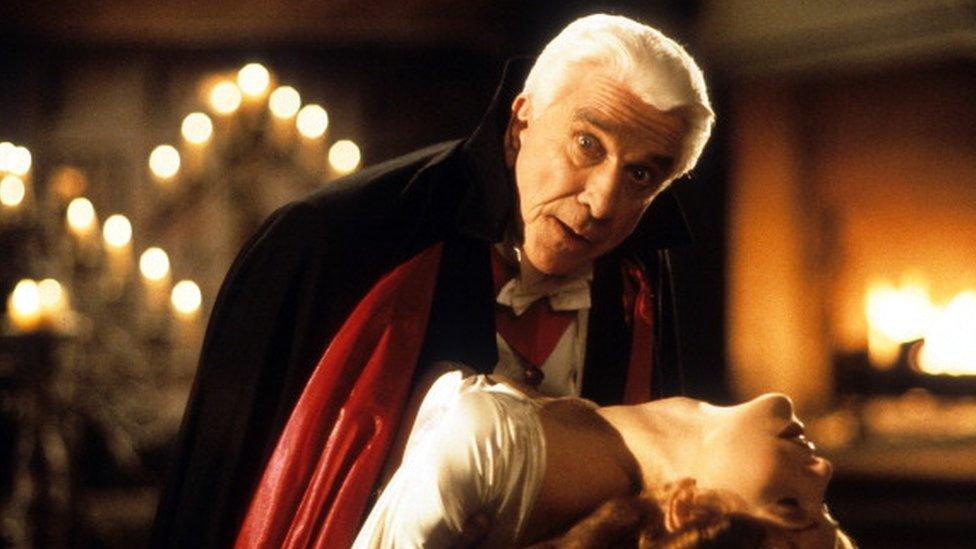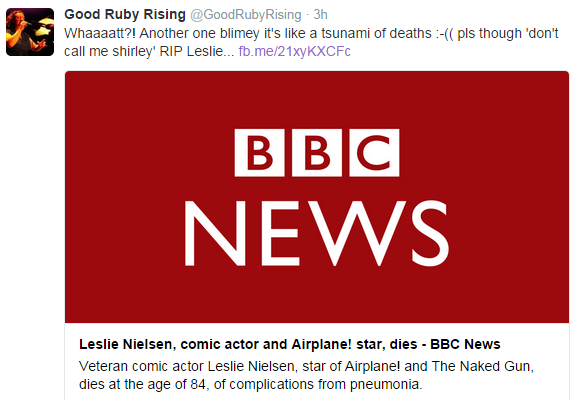Why is Leslie Nielsen STILL dead?
- Published

Leslie Nielsen - Dead (again) and loving it
Is this a familiar experience? You wake up. Check the internet and there's news of the passing of a much-loved celebrity. Then some time later after scrolling through screens of social media tributes you discover that person had actually died before... several times.
This week there have been waves of online sympathy over the passing of actor Leslie Nielsen prompting many to quote their favourite and most memorable lines from films such as Airplane! and The Naked Gun.
The only trouble is Nielsen actually died in November 2010 aged 84.
That didn't stop thousands of online users sharing this BBC story without checking the date and so it appeared that Nielsen had just died.
As a result the article popped up in the "Most Read" section which resulted in even more people sharing it. And the snowball rolled on gathering weight. Many people shared their own personal tributes on Twitter and then felt foolish when they discovered the truth.



Others were amused by the phenomenon.

Leslie Nielsen isn't the only celebrity who has experienced Multiple Death Syndrome, as we're calling it.
Artist and children's TV presenter Tony Hart and Columbo actor Peter Falk have also been mourned more than once.
So why does this happen and why will it keep happening?
BBC technology correspondent Rory Cellan Jones says the intricacies of how stories spread on social media are complex and mysterious.
"It's no surprise that the deaths of Leslie Nielsen or Tony Hart are stories that people want to share. But they're at an interesting level - not people whose death makes the traffic stop like David Bowie or Princess Diana, but big enough in people's childhoods to mean something."
So if a person's celebrity is below a certain level some of their fans may have missed news of their original death. And if they randomly search to find out whatever happened to a star, they may discover a report of their hero's death, but not notice the date stamp. And so another snowball starts rolling downhill.
It's chaos theory making its presence known via social media. An entirely innocent variation of the Butterfly Effect - very different from the malicious "RIP" trolling of celebrities who are still alive.

Follow BBC Trending on Facebook
Join the conversation on this and other stories here, external.

But it's not only news stories about the deaths of famous people that can get repeated for no apparent reason.
A 2013 article about babies affected by Thalidomide in the Sixties suddenly reappeared in the Most Read section of the BBC News website at the weekend after a storyline featured in an episode of the BBC One drama Call The Midwife.
Rory says: "It's the same with 'Man Marries Goat', external or that lovely magazine feature about the box that every Finnish baby gets - they are arresting or fascinating the first time you see them, but years later there will still be plenty of people who haven't heard about them. So when some link pops up in a related story, they get shared again and the trending bandwagon rolls again."
Is there a psychological explanation behind why this social media anomaly periodically occurs? Author BJ Mendelson says people post and share content for three main reasons: to look good, to look smart and out of the need for people to think we're funny. Mendelson says: "When we see people sharing for those reasons, we get in on it too because we don't want to be left out."
So what fuels the need to share the death of someone famous online in such a hurry without checking the facts? Rory thinks it's obvious that there's a natural urge to be first with breaking celebrity news. "Everyone now sees themselves as a celebrity reporter! I'm sure there's an element of mischief involved - which sometimes descends into malice. Social media is now where you see all kinds of human behaviour reflected - from kindness to one-upmanship to sheer nastiness."
Blog by Anisa Subedar
Next story: Sunny Leone wows web over grilling about porn past

Bollywood star Sunny Leone has won admiration for the way she responded to an interviewer who asked if she was a morally corrupting influence. READ MORE
You can follow BBC Trending on Twitter @BBCtrending, external, and find us on Facebook, external. All our stories are at bbc.com/trending.